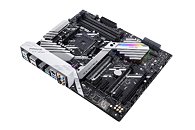Monday, January 28th 2019

ASMedia to Continue as Chipset Supplier to AMD, But X570 an In-house Chipset
AMD's socket AM4 and socket TR4 chipsets are originally designed by ASMedia. With its "Zen" family of processors being full-fledged SoCs, the motherboard "chipset" only serves to increase connectivity, and ASMedia already holds certifications for key groups such as the PCI-SIG, USB-IF, SATA-IO, NVM-Express group, etc. It's being reported now that ASMedia will develop some, if not all 500-series chipsets, with the exception of X570. The X570 will be an in-house design by AMD, which will use its own foundry partners (likely GloFo 14 nm) to manufacture it. This presents AMD with an opportunity to harden it against vulnerabilities, and have greater control over pricing, not to mention overcoming key design shortfalls of "Promontory," such as downstream PCIe connectivity.
This flies in the face of speculation that AMD would discontinue ASMedia's supply of chipset, especially in the wake of the "Chimera" vulnerability affecting "Promontory" 300-series and 400-series chipsets. The supposedly security-hardened 500-series chipset will feature PCI-Express gen 4.0 certification. What this means is that the chipset bus between the AM4/TR4 SoC and the chipset will be PCI-Express 4.0 x4 (64 Gbps), translating to double the bandwidth. It remains to be seen if the downstream PCIe lanes put out by the chipset are gen 4.0, too. Current 400-series chipsets continue to put out stale gen 2.0 lanes, compensated for by additional gen 3.0 lanes put out by the SoC. Sources also mention that ASMedia-supplied chipsets will only hit the market toward the end of 2019, which means AMD X570 could be the only 500-series chipset option between the mid-2019 launch of 3rd generation Ryzen, and late-2019. You should be able to run these processors on older socket AM4 motherboards via BIOS updates, though.
Source:
DigiTimes
This flies in the face of speculation that AMD would discontinue ASMedia's supply of chipset, especially in the wake of the "Chimera" vulnerability affecting "Promontory" 300-series and 400-series chipsets. The supposedly security-hardened 500-series chipset will feature PCI-Express gen 4.0 certification. What this means is that the chipset bus between the AM4/TR4 SoC and the chipset will be PCI-Express 4.0 x4 (64 Gbps), translating to double the bandwidth. It remains to be seen if the downstream PCIe lanes put out by the chipset are gen 4.0, too. Current 400-series chipsets continue to put out stale gen 2.0 lanes, compensated for by additional gen 3.0 lanes put out by the SoC. Sources also mention that ASMedia-supplied chipsets will only hit the market toward the end of 2019, which means AMD X570 could be the only 500-series chipset option between the mid-2019 launch of 3rd generation Ryzen, and late-2019. You should be able to run these processors on older socket AM4 motherboards via BIOS updates, though.

14 Comments on ASMedia to Continue as Chipset Supplier to AMD, But X570 an In-house Chipset
I still remember ASMedia only as an USB 3.0 chip maker.
42 Lanes of bandwidth
So don't expect too many from MSDT, even if it is AMD.
You also forget that at least 16 lanes (well, 20 or 24+ in the case of AMD) are now coming from the CPU rather than the chipset.
Also, back then, a lot more lanes were used for peripheral chips, whereas most of those features are now integrated into the chipset itself, so not as many lanes are needed.
That said, from what I know, I don't see anyone being unhappy with what the X570 will deliver in terms of connectivity and I'm sure quite a few of you will be surprised.It's called having limited resources. AMD was putting all their resources into the new CPUs to make them the best product they could and as such decided to work with a third party on the chipset. In theory, Ryzen doesn't need a chipset in a traditional sense. The A300 is more of an I/O controller than a chipset.
It would actually be cool if AMD allowed for third party chipsets like back in the old days, but I think this is highly unlikely.
And also made the slowest USB 3.0 implementation on the planet, which shows they don't/didn't have the engineering expertise needed for certain things.
Seriously tho, props to AMD for getting back into the game. PCI-E 4 will make it easier to implement stuff like 10gb ethernet on desktop platforms concurrently with multi-gpu.